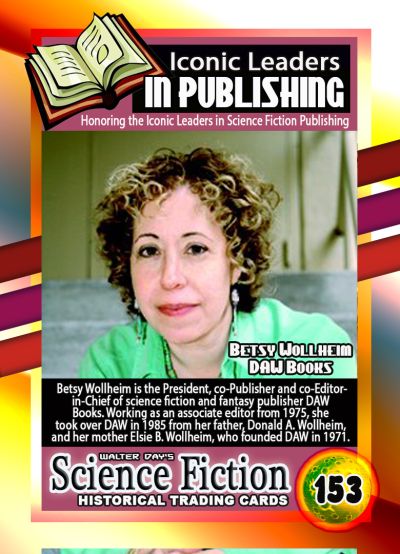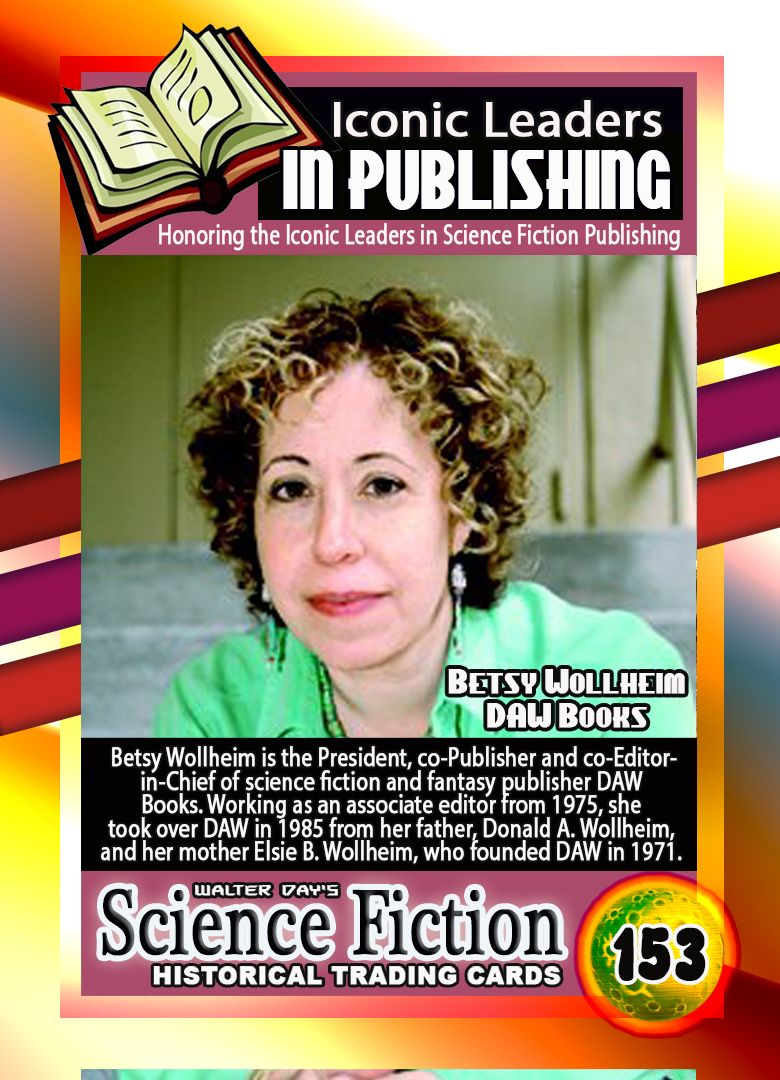- Home
- Articles
- Trading Card Spotlight
- Science Fiction Trading Card Spotlight - Betsy Wollheim
Science Fiction Trading Card Spotlight - Betsy Wollheim
Our next Science Fiction Trading Card Spotlight features Betsy Wollheim, who is displayed on card number 153, from the Science Fiction Collection. Betsy is the President, co-publisher and co-Editor-in-Chief of science fiction and fantasy publisher DAW books. Working as an associate editor from 1975, she took over DAW in 1985 from her father, Donald A. Wollheim, and her mother Elsie B. Wollheim, who founded DAW in 1971.
How did you feel when you first started out at DAW?
It was very difficult working in an office between my mother and my father for ten long years. But I stayed because I loved the work and realized that was what I was meant to do.
What was the best year for DAW and what made it so special?There were many very good years, but perhaps the best was the first year: we were founded in 1971 and published our first books in April 1972. That was a very exciting moment for my parents. My dad had worked for pulp magazines in the 1930s, was one of the first (and for some years the only) paperback editor of Avon from 1943--1952, and founded Ace Books in 1952 on behalf of the Ace Magazine Company. He had never been his own boss, and was thrilled to finally own his own company. He dedicated DAW to publishing only his favorite genre: science fiction and fantasy. We were the first company formed to only publish SFF.
If you could describe Walter Day in one word, what would that word be and why?
Considerate. He kindly asked me to write 200 words about my father’s career for his trading card, and printed every word, even when I couldn’t cut down my father’s career to fewer than 350 words!
When did you first meet Walter Day and where was it at?
I met Walter online, when he asked me to write info about my father’s trading card and my own.
How early in your life did you know you would be in the science fiction editing field?
I started working for my dad as a copyeditor at Ace when I was 16 (1968). And started working full time at DAW when I moved back to NYC from Cambridge, Mass. in 1975—I was 23.
How has your career changed today changed from when you were younger? What do you like or dislike about the changes?
I worked with my parents and trained with my father for a decade as an Associate Editor. In 1985, my father became catastrophically ill, and I took over his desk as Publisher during a very dark time for my family. That was a very hard year and I had to make many difficult changes at DAW. When my old friend and veteran editor Sheila Gilbert joined me later in the year, we became a team and have continued to be co-Publishers now for thirty-five successful and happy years.
If you did not become an editor, what would you be doing?
Probably being a professional photographer and struggling to pay the rent!
What was your reaction when you won the World Fantasy Award for Lifetime Achievement?
I was surprised, honored, and humbled. But I also thought: "How did I get so old?"
What are your favorite hobbies today?
I collect eccentric antiques, and love flea markets and antique markets. The artifacts of the past fascinate me—especially odd things.
What does it take to be a professional publisher/editor today?
I believe editorial talent is inborn, but as there are very few positions available due to the shrinkage of the industry, I’d say in addition to innate talent, a person needs drive, ambition, and, of course, passion and knowledge.
What do you think about electronic books that you can download versus the actual physical hard copy?
I love e-books. E-publishing has saved traditional publishers by offsetting the very high prices of paper, shipping, and warehousing. Without e-books, traditional publishing would be in very bad shape.
Where can readers see your work or perhaps order books from you?
DAW books are sold anywhere books are sold.
What are your favorite books past and present?
I remember reading Dune in the 1960s—it had a profound effect on me. (But I never read the sequels: my dad advised against it. He said Herbert never intended Dune to have sequels.) As for the books I’ve worked on in my career, I’d say Downbelow Station by C.J. Cherryh has a special place in my heart because it was the first Cherryh book I worked on (with my father) and it won the Hugo—even though it was a paperback original. That was very special, since people back then thought no paperback original could win that coveted award. C. J. is still very special to me. I’m honored to be her editor. I’m also very proud of being Mercedes Lackey’s first editor, and Tad Williams original editor (and I still edit Tad with Sheila—he’s the only author we work on together) his To Green Angel Tower was the first DAW book to be on the New York Times and the London Sunday Times bestseller lists. Also, I’m Nnedi Okorafor’s adult fiction editor—the first Nnedi book I published, Who Fears Death, won the World Fantasy Award. And I can’t forget Patrick Rothfuss, whose second book, The Wise Man’s Fear, was DAW’s first #1 New York Times bestseller. But I love all my authors.
What were your parents doing before they founded DAW in 1971?
My father, Donald A. Wollheim, was a pioneer in the field of science fiction. As a fan, he published some of the first fanzines, including the Phantagraph (1935-46), organized the first science fiction convention in 1936 in Philadelphia, and was a founder of one of the first science fiction organizations, The Futurians. During this time Wollheim also edited sf pulps, Cosmic Tales and Stirring Science Stories.
As a writer Wollheim published nearly a hundred short stories, 18 sf novels and three works of nonfiction either under his own name or one of eight pseudonyms. His short story “Mimic” was made into a film in 1997.
In 1943, Wollheim edited The Pocket Book of Science-Fiction, the first science fiction anthology, and the first book with the words “science fiction” in the title. He became one of the first editors of the Avon paperback line in 1943, and in 1947, edited the Avon Fantasy Reader. In 1945 he edited the first hardcover sf omnibus, The Viking Portable Novels of Science, and in ’47 he edited the first all-original sf anthology, The Girl With the Hungry Eyes.
In 1952 he left Avon, founded Ace Books for owner A.A.Wyn, and introduced the double novel. In his twenty years of running Ace, he published: Robert Silverberg, Philip K Dick, Samuel R. Delany, Ursula K. Le Guin, Fritz Leiber, Andre Norton, Marion Zimmer Bradley, Jack Vance, Roger Zelazny and many others great names. He published the paperback edition of Dune and the unauthorized first paperback of The Lord of the Rings. At Ace Don started the annual World’s Best Science Fiction anthology series which he continued editing until his death.
In 1971 Wollheim and his wife Elsie formed their own publishing company DAW Books, Inc., the first company devoted exclusively to science fiction and fantasy. At DAW he discovered C.J. Cherryh, Tad Williams, C.S. Friedman, and Tanith Lee among others. At DAW he also translated sf novels from abroad, fought for the rights of gay expression in sf and championed women writers. He was the third editor (after Gernsback and Campbell) to be named to the Science Fiction Hall of Fame.
Who is your favorite celebrity and what makes that person special?
I don’t really follow celebrities, but I could say Jane Fonda because of her lifelong political activism.
Are you still involved with science fiction today, and what role do you play?
Still the same: editor, co-publisher, and co-owner (with Sheila Gilbert) of DAW Books.
What do you see yourself doing in the next 10 years?
Hopefully, the same thing I am doing now.


